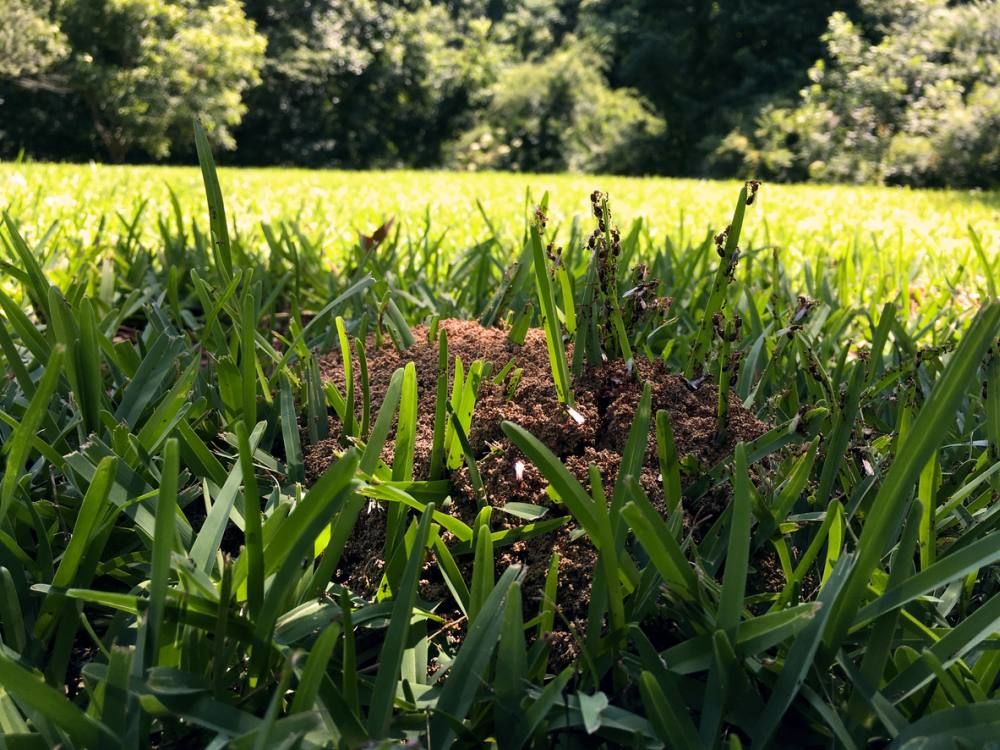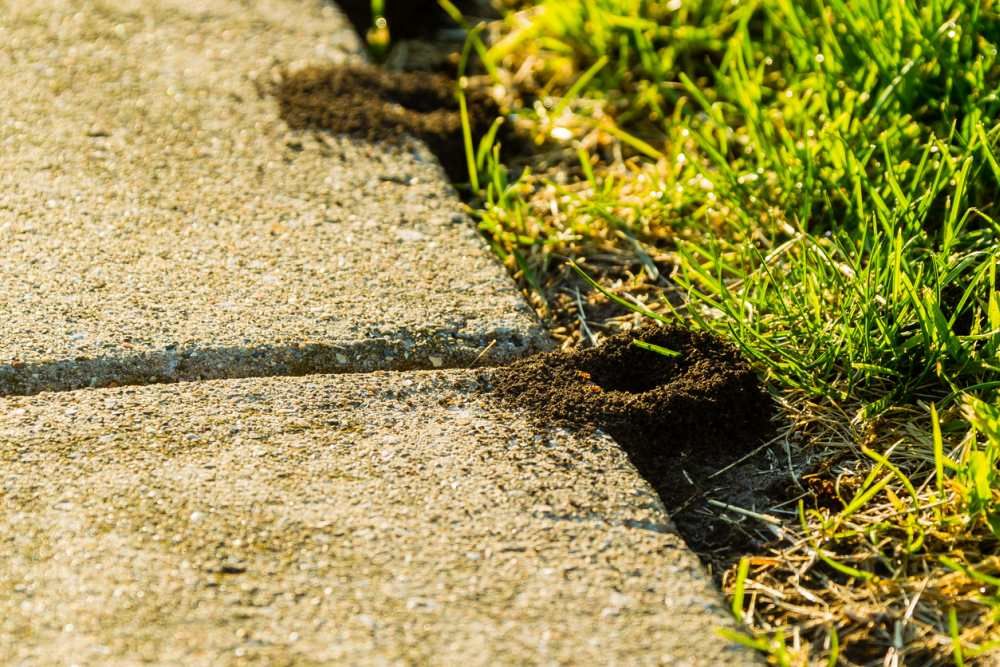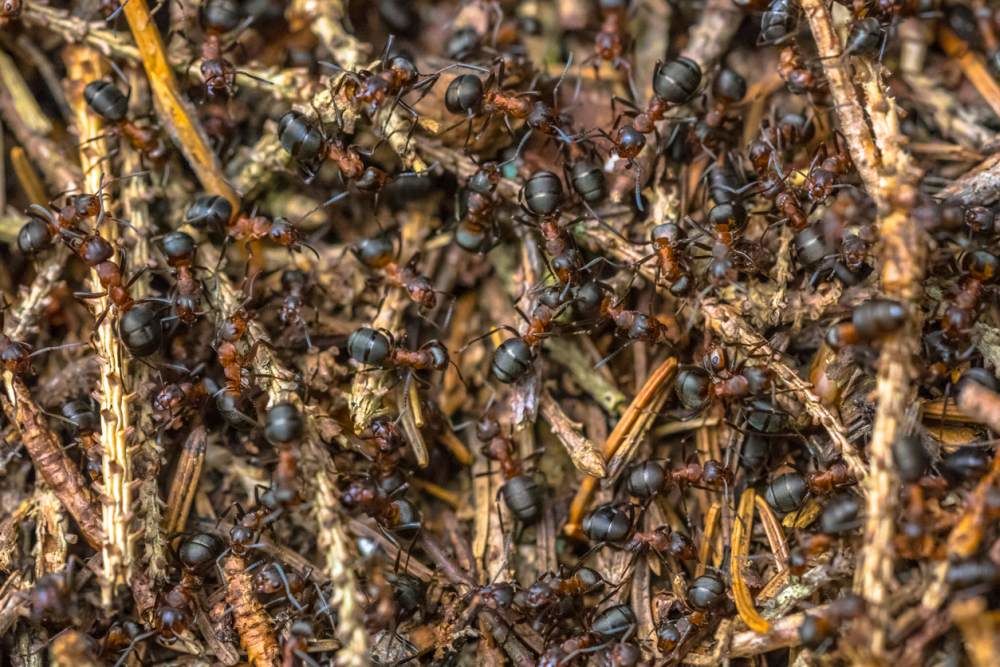If your problem is indoors, then check out this guide. Here, you’ll find everything you need to know to get rid of ants in your home effectively, efficiently, and even naturally.
The Importance Of Ants

Ants also take seeds beneath the soil and leave them, allowing new grass and plants to grow. More often than not, these are plants we actually want to keep around. Without ants, plants would start to die, and we all know how that would turn out.
Ants can also keep other pests away. If you have ants, chances are, you won’t have wasps. Not to mention, different species of ants don’t live together well, so you probably won’t have more than one kind of ant.
So, before you wish ants were eradicated from the earth, remember how they benefit us and the planet we live on. You can try to get rid of the majority of the ants in your yard, but don’t venture out too far!
Types Of Ants
Since some ants are more harmful than other ants, it may be useful to find out what type of ants you are dealing with before you start to eradicate them. Some ants are harmless while others can leave a nasty bite.
Note: These are the ants found in North America. Other ants can be found on other continents, but these are the ants that are most common in North America.
Argentine Ant
Size: 1.6mm
Lifespan: One year
Color: Light to dark brown
Bite or Sting: Bite
Season: Spring To Autumn
Swarm: No
Habitat: Moist soil and under buildings
Argentine ants will drive out other ants from the area. So if you do have them, you probably won’t have any other type of ants. They are natural predators. If they don’t bother you, leave them be to protect you.
Carpenter Ant
Size: 1/4 to 1/2 in.
Lifespan: 3 to 6 years
Color: Black, sometimes red
Bite or Sting: Bite
Season: Spring
Swarm: Yes
Habitat: Moist wood
Carpenter ants prefer a nocturnal life and usually hut at night. They are seen primarily at night but can hunt for food during the day if necessary. Another ant to leave alone if they don’t bother you.
Fire Ant
Size: 1/8 to 5/8 in.
Lifespan: Workers live less than six months while queens can live up to six years
Color: Copper brown
Bite or Sting: Sting
Season: Spring To Summer
Swarm: Yes
Habitat: Any Soil
Fire ants are the most dreaded type of any in North America. They destroy crops and their sting can cause pain for days. Get rid of fire ants as soon as possible to prevent heartache.
Pharaoh’s Ant
Size: 2-6mm
Lifespan: Less than a year
Color: Yellow-brown, black, or red
Bite or Sting: Bite
Season: All Seasons
Swarm: Yes
Habitat: Warm, humid places
Pharaoh ants can form new colonies when disturbed. So ask an exterminator before trying to get rid of them yourself or you’ll only help them spread.
Sugar Ant
Size: Less than 3mm
Lifespan: Up to 15 years
Color: Orange or black
Bite or Sting: Bite
Season: Spring
Swarm: Yes
Habitat: Anywhere moist that they can find sweet substances, which is where they got their name
Sugar ants have to separate working classes. Smaller ants work together while the larger, stronger ants work together. The smaller ones rarely bite while larger ones can be painful.
Thief Ant
Size: Workers are less than 1mm while queens can be 5mm
Lifespan: One year
Color: Yellow or brown
Bite or Sting: Sting, rarely used due to their small size
Season: Summer and Fall
Swarm: No
Habitat: Small cavities or fields
Thief ants typically find homes rather than build them, perhaps this is where they got their name. They can be found in small holes in wood, furniture, or in the ground.
Harvester Ant
Size: Less than half an inch
Lifespan: Up to 20 years, but males die after mating
Color: Red or orange
Bite or Sting: Both
Season: Summer and Fall
Swarm: Yes
Habitat: Holes in grass that are up to 15 feet deep and up to 35 feet wide underground.
Harvester ants have small beards on their chin, one of the only ants to have these. The hairs work like the feelers on their antennae.
Black House Ant
Size: 3mm
Lifespan: Up to 30 years
Color: Black
Bite or Sting: Bite
Season: All seasons
Swarm: Yes
Habitat: In walls or standard anthills where food is nearby
Black house ants are usually found indoors but they can have nests outdoors. If they do, it’s usually near a house where they can sneak inside to your kitchen. These ants are very common, so don’t be alarmed by them.
Odorous House Ant
Size: Less than 1/8 in.
Lifespan: Less than a year
Color: Black or brown
Bite or Sting: Bite
Season: Spring and Summer
Swarm: Yes
Habitat: Indoors or near houses
Odorous ants get their name from the strong rotten coconut or rancid butter smell they omit when smashed. Be careful when disposing of them to prevent the smell from spreading.
Getting Rid Of Anthills

Getting rid of the anthills in your yard may be all you need to do. After all, you may not want to get rid of all of the ants in your yard if they’re not harming you. So getting rid of the anthills may control them enough to get them out of your hair.
Raking
One of the easiest, safest, and most effective ways to get rid of anthills is to rake them. This will destroy their home and leave them without a valid entry point. If you do this about once a week when the weather permits, it may take care of the problem altogether.
Flooding
Because queen ants can lay thousands of eggs a day, sometimes, anthills can be rebuilt faster than you can keep them raked down. The most efficient and safe way to get rid of ants in anthills is to pour boiling water down them.
This may seem inhumane but it’s actually faster than other methods we’ll talk about later. After you pour the water down the anthill, carefully, then you will want to rake the anthill to prevent an escape.
Getting Rid Of Widespread Ants

If flooding anthills doesn’t control the ants in your yard, then you may need to spray the entire thing. Any of these mixtures can be poured down anthills. But when that fails, you can spray your entire yard with them.
Safer mixtures can be sprayed anywhere. The others will probably need to be sprayed only on ant trails and around hills. Leave chemical mixtures to dry before letting dogs or kids play outside again.
Soapy Water
Soapy water is probably the safest way to get rid of ants. Mix liquid soap with water and put it in a spray bottle. Spray it along trails and in the general area that ants are found. However, it is most effective when sprayed directly on ants.
Diatomaceous Earth
Diatomaceous earth is the most common over-the-counter way to kill ants effectively. All you have to do is sprinkle it along the path they usually take. When the powder reaches them, they will dry out and dehydrate.
It’s also harmless to kids and pets, so you don’t have to worry about anyone getting into it.
Vinegar
Mix equal parts water with vinegar and get to spraying just as you would insecticide. But be careful because too much vinegar can kill plants and grass. That’s why this one works best if poured down anthills or sprayed directly on ants.
Red Pepper
Any time of powdered red pepper in your house should kill ants quite quickly. Sprinkle it on anthills and ants to dry them out. This is faster than most powders due to the strong nature of pepper.
Cinnamon, Preferably Oil
Cinnamon can kill ants in any form, but cinnamon oil works the fastest. Add a bit to a spray bottle of water and spray trails and ants when you spot them. Be careful not to overdo this in the garden or on the green grass.
Baby Powder
Baby powder works much like diatomaceous earth only is more commonly found in the cabinet. For ultimate safety, get a baby powder that is talcum-free, as talcum has been recalled often for use on babies.
Saltwater
If you’re in a hurry and don’t have anything on hand, a simple saltwater solution may do the trick. Just make sure not to use too much on plants as it will dry them out too. Use it sparingly and only in problem areas.

When To Call A Professional
If you’ve tried your best and still can’t get rid of ants in your yard, don’t worry. It’s not the end of the world. A professional exterminator can get rid of ants in no time. They will use pesticides safely and give you natural options as well.
They also know all of the precautions to take and what to let you know before leaving you. Never be afraid to talk to a professional, no matter what area of life you’re facing issues. They are there for a reason and are always ready to lend a hand!



![A Tranquil Jungle House That Incorporates Japanese Ethos [Video]](https://asean2.ainewslabs.com/images/22/08/b-2ennetkmmnn_t.jpg)









